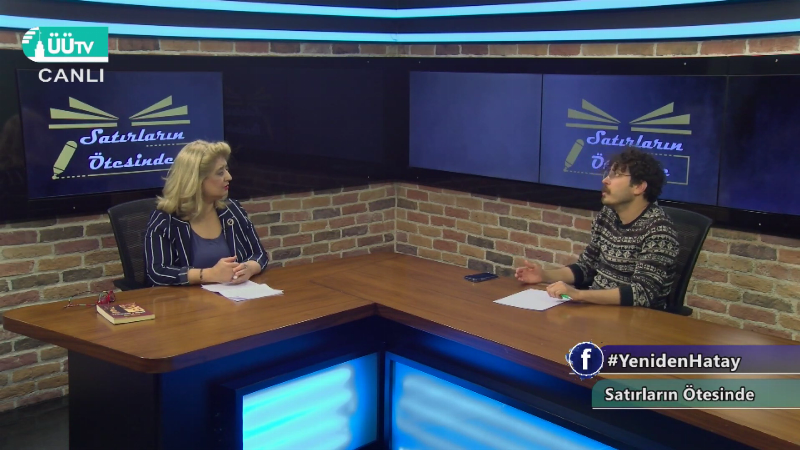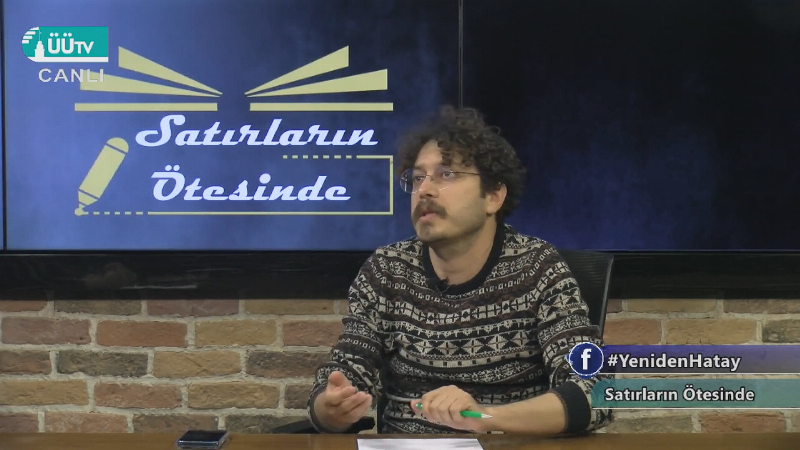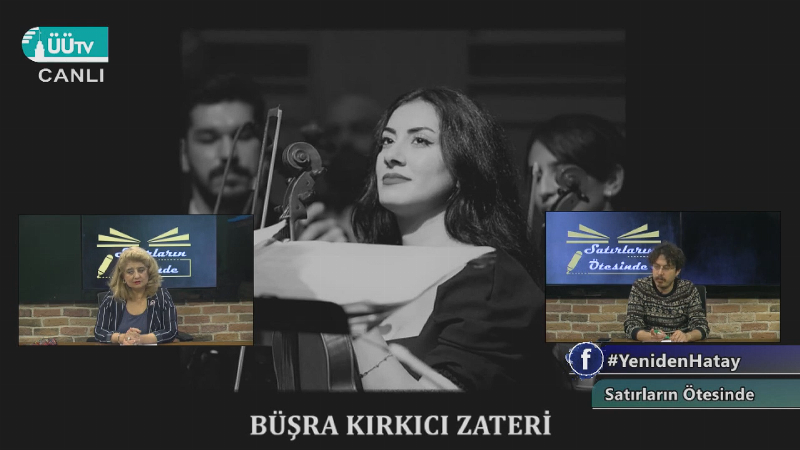Hatay Academy Orchestra Conductor: "Antakya is like a homeless child with a bare foot"
ÜÜTV had an important guest from the earthquake region this week. Ali Uğur, who is the founding conductor of Hatay Academy Orchestra, was the guest of the 'Satırların Ötesinde (Beyond the Lines)' program that is broadcasted live. Describing Antakya as a homeless child with a bare foot, Uğur said that people found themselves in another land before the tears touched the ground. Ali Uğur stated that this is the greatest pain that they have to leave without being able to live their mourning, while the screams of their loved ones continue.

The founding conductor of the Hatay Academy Orchestra Ali Uğur from the earthquake region was the guest of the 'Beyond the Lines' program, which was broadcast live on Üsküdar University Television (ÜÜTV). Faculty member of Üsküdar University Assoc. Prof. Feride Zeynep Güder explained the effects of the Kahramanmaraş-centered earthquake on Antakya and the art performed in the region.

Antakya is like a child with a naked foot...
Ali Uğur, who witnessed the restoration of life in Antakya and lost 4 of his friends in the earthquake in the orchestra he took part in, expressed his feelings and thoughts on live broadcast. Uğur said that "Right now, Antakya is like a homeless child with a bare foot. We are trying to be shoes for him. His house has been demolished, we are trying to become a home. We are in a great grief, and our last 3 rehearsals have been emotionally very heavy for us. For the first time, we made music without our friends, we used our voices for the first time. This time we played the works without them, which we used to play with them, or we played the works in memory of them. For example, everything is very emotional for us, but we have never given up. Yes, there was destruction. How can we build new life out of this destruction? We are talking about a city that has disappeared physically, but its spirit is still alive. That's why our hope is still fresh, actually we are more hopeful and we have grown more, we have known very beautiful people in this process. These things may have happened as a result of pain, but they can also be good things from pain.".

It is unfair that Hatay, which has traces of two civilizations, is reduced to künefe and gastronomy...
Artist Ali Uğur mentioned that the historical and spiritual cultures of Antakya were strong as well as its cuisine culture and stated that Antakya was an ancient land. Uğur said that "The subject of gastronomy was something I was concerned also before the earthquake. It was a matter of concern that not only for me, but also for all the intellectuals of Antakya. I do not judge those outside of Hatay because that is what shown to them. The rulers of Hatay shows Hatay to the outside in that way, and that is where the real problem lies. The intellectuals of Antakya are all suffering from this issue, they are sad because we are talking about an ancient land. One of the few ancient cities in the world. We are talking about two civilizations in which the Hittites and the Romans had such large layers of culture, which influenced the whole world with their culture. It is a city which was center of both civilizations. With so many ethnicities living together, we reduce so many cultures to künefe, to gastronomy. Cuisine and künefe do not create culture. Cultures create cuisine. Hatay needs a vision to see this. Yes, our food is very delicious, our künefe is very nice, but it is the multi-layered culture that creates it. The real culture, history, ancient and philosophy should be mentioned. In other words, an example that I always give, and that I will be always insisted on giving it, is Libanios, a philosopher who lived in Antakya in the 4th century. He founded the Antakya Academy in the 4th century, became the center of education in Antakya and the east at that time, and intellectuals from many parts of the world came and received education. At that point, it was now lower in terms of culture and art than the point where Antakya had come before the earthquake. Antakya is not a gastronomic city. Gastronomy is just a title of it, but we are talking about a great ancient country. From religions, languages, art, philosophy, culture to architecture… It was the 2nd largest city in the Ancient Rome at that time. In other words, it would be unfair to such a city to have gastronomy as only takeaway from this city. If we just see grief as frustration, we cannot create the culture of the new city, and then we die.".
Before the tears touched the ground, people found themselves somewhere else...
Uğur mentioned that there is a migration of qualified people in Antakya and said "It was a port, a home for us in Antakya. In a storm, a ship in the ocean fights all the storms, but there is a lighthouse and there is a harbor where it will take refuge. Antakya was like this for us. The real problem here is that the place we call a home, what we call a port, has been destroyed. There will be a disaster, your house will be destroyed or, for example, a loved one will die, you will experience the pain in your own city, you will go and take refuge in a friend. You take refuge with your parents, you go to a place where you hang out all the time and cry. You experience your pain in your own city. We could not do it, our city was destroyed, our dearest, our relatives, our friends, our memories were all destroyed, and we could not live our pain there, all the people had to leave. Before tears touched the ground, people found themselves in another city or while the screams of their loved ones continued, they had to leave, they could not help, they had to leave with unfinished business they had. This was the real pain. I did not have a friend to go and share my pain with. Antakya has given a serious migration of qualified people after this earthquake, teachers, artists, science builders, academics, doctors… They have all gone and there is a possibility that they will take root in the places they go. If these people take root in the places they go, they will not be able to return to Antakya. Let's say we build a beautiful city from an architectural point of view. Isn’t it the cultural actors who will give meaning to these architecturally beautiful aesthetic buildings? Thus, a building does not create culture. For example, none of us were upset because our shopping center was destroyed in this earthquake. The apartments were destroyed, we did not grieve for the apartments, but for our friends who died in them. While we are lifting the city up physically, how are we going to bring back these cultural actors in Hatay and the local area? We need a reason, a motivation. It is the local area that will sustain Antakya. Life goes on. Our city has been destroyed, but there are those who live, there are children, there are newborns, there are those who were born in this trauma.”.
Platform of Hatay Standing Again
Uğur talked about the platform of which he is one of the founding members and said " Hatay Standing Platform Again (HAYAP). Within the platform, there are archaeologists, historians, researchers and scientists. We have fellow archaeologists there. Their fields of study are Antakya, Roman Antakya, History of Antakya. It is actually the 35th destruction experienced since Rome. History has shown us this and it has come across us. It is like it is a recurring thing, but it has a breaking point here. Of course, there are other platforms like this that I am involved in. Hatay is like our Common Issue. I am a founding member of HAYAP, we founded it together, there are academicians, artists, archaeologists, university representatives, scientists and associations. You can follow us on our website hayap.org or Instagram, we have published our manifesto there.”.
Reporter Tarkan Küçükgüzel
Üsküdar News Agency (ÜNA)